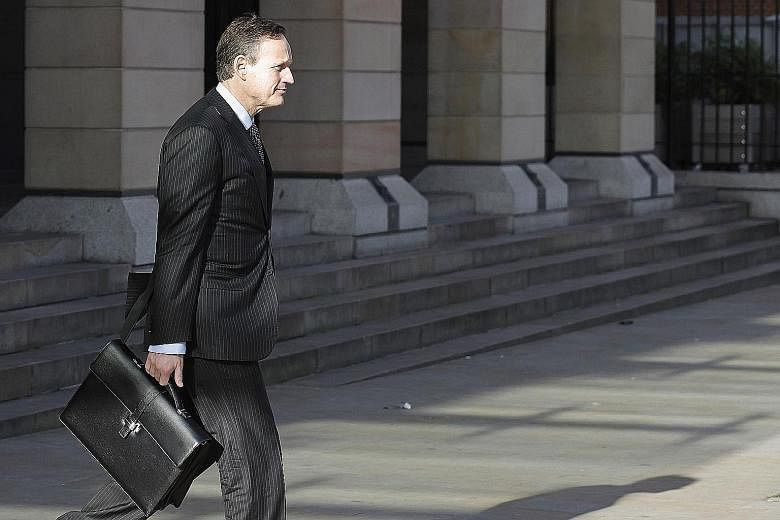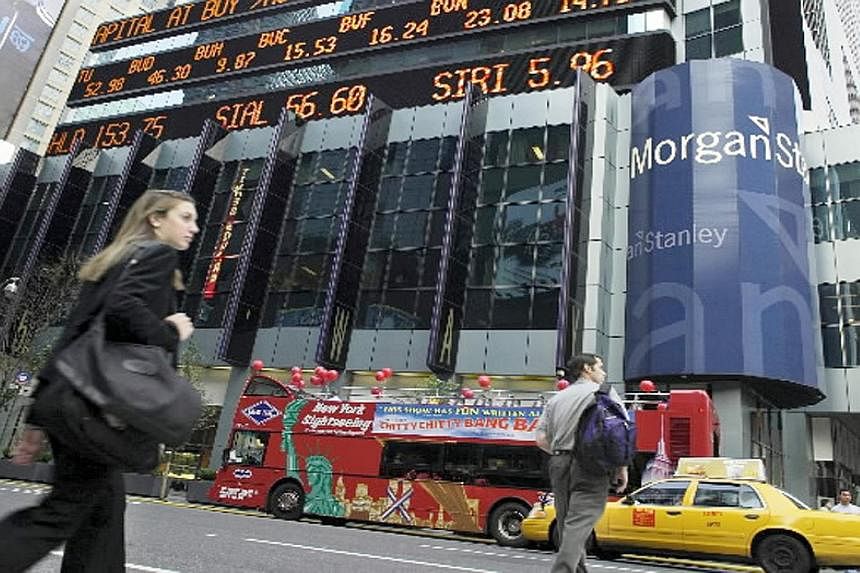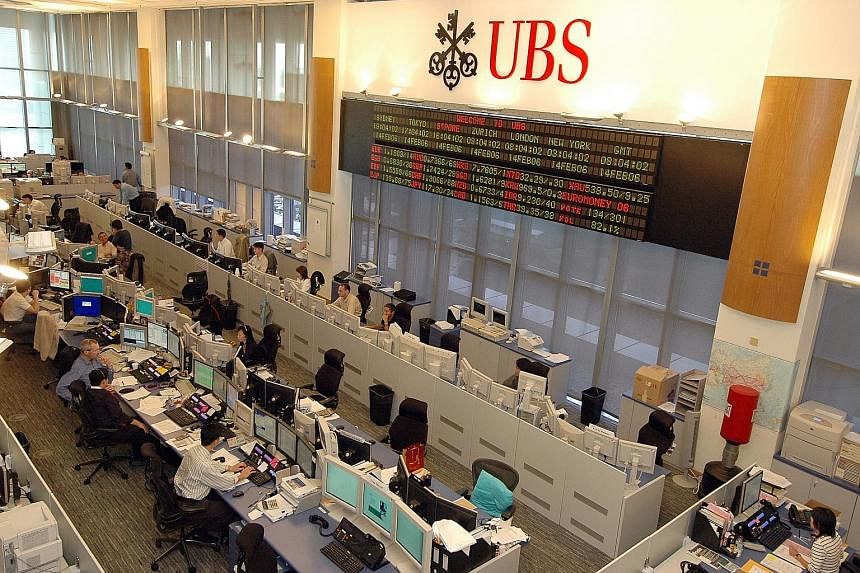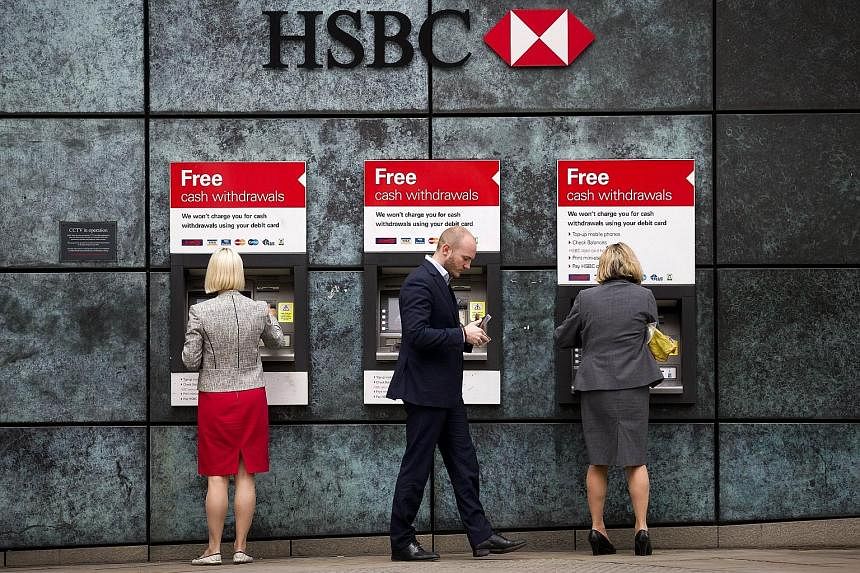When Barclays fired its chief executive last week, it joined three other European banks - Deutsche Bank, Credit Suisse and Standard Chartered - that have also turfed out their bosses this year.
Although it has been seven years since the last financial meltdown, they are still grappling with flattened revenues and tougher regulatory scrutiny, with many struggling to win over shareholders with their overhaul plans.
At Barclays, ousted chief Antony Jenkins failed to restore confidence in the bank's troubled investment banking division, which was fined US$2.4 billion (S$3.3 billion) in May for rigging currency markets and interest rates. The amount would have wiped out more than a third of DBS' earnings last year, or almost all of UOB's earnings last year.
SHADOW OF THEIR FORMER SELVES
Investment banks, once the cradle of high-money culture, became targets for reform after the crisis, which reduced them to a shadow of their former selves, both in terms of profit and culture.
Singapore-based leader of EY's Asia-Pacific banking and capital markets practice, Mr Jan Bellens, said: "Speak to investment bankers (on the trading floors) in Singapore or Hong Kong - a lot of them will complain that their job isn't as much fun as before.
"Previously, the front office was very aggressive, sales-driven. Now, there are lots of standards that are being imposed on them..."They need to be extremely careful on e-mail, they no longer have access to chatrooms or social media platforms."
Stricter regulation of structured products has also put an end to the boomtime when financial wizards racked up bonuses by securitising everything from life insurance to sub-prime mortgages.
Mr Vinayak H. V., a Singapore-based principal at consultancy giant McKinsey, said the big banks are shifting their focus to "more real economy stuff", such as cross-border transaction banking, and more "vanilla" capital market products.
Then, there are the Basel III global regulations, requiring "too big to fail" banks to submit regular reports on their liquidity coverage ratios so as to avoid a repeat of the 2008 financial crisis when governments were forced to bail out banks.
The tighter capital and liquidity rules deliberately trim the margins of the capital-intensive fixed-income trading business. With trading volumes also down from their pre-crisis highs, many banks have scaled down their once-lucrative trading floors.
Their focus has, instead, turned to advising on mergers and acquisitions and capital markets underwriting - businesses which are fee-based, said Mr Vinayak. "Traditional investment banking is making a huge comeback globally," he said.
The complex new rules have also forced banks to build up their IT systems and double the number of risk and compliance officers, with some specialists drawing salaries higher than those at the front line, said consultants.
EY estimates that the costs for major investment banks last year were 25 per cent higher than in 2005. And 75 per cent of banks' IT budgets is spent on systems maintenance.
This puts the heat on front-line investment bankers to become "product pushers", pressing clients to issue equity or hedge certain positions to help the bank's balance sheet, instead of acting as "trusted advisers", said Evercore Asia chief executive Keith Magnus, who is based in Singapore.
This is one reason senior dealmakers like himself have been quitting the big banks for smaller advisory firms.
"The thinking has been, what can I push this client to do? At independents, we don't have that capital requirement," he said.
PRIVATE BANKS WATCHFUL OVER NEW RULES
It is more expensive today to run a private bank than it was before but this has not stopped many banks from jostling for wealth management business.
Shareholders with memories of the last banking collapse tend to favour bank strategies that focus on growing the wealth management business, which is a more stable revenue generator than investment banking.
Morgan Stanley is a case in point. An investment bank on the brink of bankruptcy in late 2008, it became a bank holding company, and began a new push towards wealth management - a move that shareholders have since rewarded.
Mr Ronald Ong, Morgan Stanley's chairman and chief executive for South-east Asia, said: "In Asia, private wealth management has become an integral part of our institutional securities group, and a major strategic priority."
Then there is the old rivalry between Swiss banks UBS and Credit Suisse, with UBS coming out tops as far as stock price performance goes, after it downsized its investment bank and became more aggressive in the area of wealth management.
"The Asia-Pacific continues to be one of the fastest-growing regions in the world for UBS, and Singapore has established itself as one of our most important global booking centres outside Switzerland," said Mr Joseph Poon, UBS Wealth Management's head of ultra-high net worth for South-east Asia.
But even as various banks are clamouring to service Asia's newly rich, they remain wary of bigger regulatory shake-ups in the future.
The source of the tremors is Europe, where new reforms have banned financial advisers from earning kickbacks from product sales. Instead, European clients pay a fee for any advice they receive. The new rules, called the Mifid II directive, push for greater fee transparency and protect consumers from product-churning.
Mr Justin Ong, leader of PwC's Asia-Pacific asset management practice, said: "That's not come to Asia yet but, by definition, because the whole industry in Europe moved to that cycle, that thinking is going to come around."
With Singapore's own Financial Advisory Industry Review keeping commissions reform on the agenda, Mr Ong said he expects the shift to a fee-only model to happen in another three to five years.
Meanwhile, the gravity of the last crisis has not been lost on the private banks, which were the targets of lawsuits when their high-net-worth clients lost millions in the market turmoil. Private bankers now spend more time filling out due diligence and disclosure forms, consultants said.
But the most drastic piece of enforced change, so far, might not be crisis-triggered. In 2013, Singapore made it a money laundering offence for a bank to help tax dodgers hide their funds.
All in, the cost of business for wealth managers has gone up by at least 10 per cent to 15 per cent since the crisis, said Mr Ong. This despite the fact that bankers are still not paid as much as they once were.
Compliance costs are set to keep climbing, Mr Ong said, as bankers await new standards from the Monetary Authority of Singapore that will guide their outsourcing practices, including instances where consumer data is handed to third parties, such as printing companies or asset managers.
NEW ROLE FOR REGIONALS
Dogged by the myriad laws of multiple international regulators, big banks have been reassessing their country strategies with an eye on trimming costs.
Said Mr Vinayak: "Some banks are trying to focus on specific regions rather than trying to be everywhere. HSBC is a classic example of that."
Last month, HSBC announced a restructuring plan that would shed 50,000 jobs worldwide.
Citigroup, the largest foreign bank in Singapore, with 10,000 employees, is also "simpler, smaller, safer and stronger", said Mr Michael Zink, Citi's country officer for Singapore and head for Asean. "Citi today is very different compared with before the crisis. Our firm is scaled to serve our clients."
But as big banks tread with extra caution in their risk-return analysis, they may also be slower to seize new opportunities, said DBS compliance head Lam Chee Kin.
So far, no United States or British lenders have made inroads into Myanmar, which is not surprising since the developing country is part of the notorious Golden Triangle, and can be marked as "high-risk" from a financial crime perspective.
The analysis for a lot of British and US banks is that the opportunity represented by Myanmar is not good enough relative to the rising cost of financial crime penalties.
"Financial crime enforcement is causing banks to close businesses that pose unacceptable risk. But the point is to exclude criminals from the system and not whole sectors. Asian banks may be better placed to understand such nuances in our countries," said Mr Lam.





